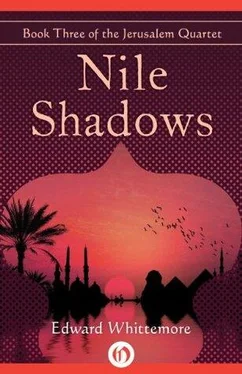Edward Whittemore
Nile Shadows
— 1-
An Australian Hand Grenade
On a clear night in 1942 a hand grenade exploded in a Cairo slum, killing one man instantly.
The explosion shattered the mirror in the half-light of a poor Arab bar, a bare room where laborers went to sip arak into oblivion. The hand grenade had come flying in through a shabby curtain separating the bar from an alley, thrown from a group of Australian soldiers who were out drinking and brawling and victoriously celebrating life, recent survivors of the disastrous battle for Crete.
Other than the dead man, no one in the bar received more than superficial injuries. And in the confusion following the explosion, amidst the shouts and screams and drunken cries of bloody wogs , the young Australian soldiers had fled into the shadowy byways of Old Cairo and disappeared, never to be officially identified in life, some never to be identified in death as well.
Such violent incidents were far from uncommon in wartime Cairo. The fierce campaigns in the Western Desert still raged uncertainly, as Rommel's powerful Afrika Korps threatened to overrun Egypt and the Suez Canal. From there the Middle East and much more would be open to the invading Germans, so soldiers in the British forces were apt to play desperately with time and darkness before going into the desert to meet the advancing panzers.
In such a situation, one stray death in a Cairo slum could be of little significance, and an Egyptian policeman quickly concluded his routine investigation.
From documents found on the dead man he was identified as a minor criminal and morphine addict, a petty gunrunner sometimes known as Stern, a vagrant with no visible means of support who had moved erratically from one poor lodging to another in various Cairo slums over the last few years.
Stern's criminal record further stated that his name was to be found in the files of a number of police departments in the Middle East, and although he didn't appear to be of Egyptian origin, his dialect was said to be flawless. It was therefore assumed that he was probably a genuine Levantine by birth, whose sordid pursuits in the 1930s had caused him to spend at least as much time in Egypt as elsewhere.
The history of Stern's criminal activities was unimpressive. In the years leading up to the Second World War he had smuggled arms to many groups in the Middle East, with perhaps more emphasis on Palestine. Yet he had never been clever enough to make any money from these operations, for his record also showed that he had lived in unrelieved poverty. On several occasions he had been apprehended and sentenced to brief prison terms on secondary charges.
Stern, in short, had lived an obscure and meaningless life, a marginal existence that had come to nothing.
Only one brief entry in Stern's file tended to contradict this uneventful account, a daring escape he had made from a Damascus prison in the summer of 1939. From the nature of the escape it was apparent it had been unplanned, and what made it inexplicable was the fact that Stern had been due for release from the prison within twenty-four hours. But then a few weeks later Hitler's armored divisions had crossed the Polish border to begin the war, so the matter had soon been forgotten, a strange and isolated episode in Stern's otherwise purposeless career.
Stern's nationality was listed on the death certificate as Unknown , lost long ago in the maze of counterfeit documents he had used throughout his life. So numerous were the aliases in his record, in fact, there was no way to know whether Stern was the dead man's true name.
In addition, so contradictory were the disguises of his background, it could not even be determined whether he was a Moslem or a Christian or a Jew.
There were also no associates to question. Stern, or whoever he was, had not only worked obscurely but lived his life alone, without family or friends, without acquaintances or neighbors to remember him. To all appearances, without anyone at all. Yet when the time came to dispose of the body, done quickly in Cairo because of overcrowding among the dead, a shabbily dressed woman turned up at police headquarters saying she wished to make arrangements for a burial. The woman carried a Greek passport and the story she told seemed plausible.
She had first met the dead man about a year earlier, she said, in a small neighborhood restaurant where she sometimes took her evening meals. Subsequently they had fallen into the habit of eating there together on an irregular basis, never more than once a week and often no more than once every two or three weeks. It had been company of a sort for both of them. She had known the dead man only as Stern, and he had called her by her Christian name, Maud. Although she was an American by birth, she had lived in the Eastern Mediterranean for years.
Since Stern had never known more than a day in advance when he might be able to come to the restaurant, he had left notes there saying when he would show up. She had gone to the restaurant every day to check for these notes, even when she wasn't planning to eat there in the evening. She didn't know where he had lived or what he had done. It was wartime and people came and went. Explanations were pointless, reasons meaningless. She had assumed he held some kind of minor clerk's job, as she did.
Why do you say that? asked the policeman behind the desk.
Because of the way he dressed.
How was that?
Like me. Trying to make ends meet.
Did you speak Arabic together?
No, you can hear I don't speak it well. We spoke in Greek or in English.
French?
Sometimes.
The policeman switched to French, which he was studying in the evenings to promote his career.
Did he ever talk about the past? What he used to do?
The woman was trying hard to control herself. She looked down at her worn shoes and suddenly clenched her fists in despair.
No. I just assumed he was from somewhere and had done something once. Isn't everybody from somewhere? Hasn't everybody done something once? We never talked about the past. Can't you understand?
The woman broke down and quietly began to cry, and of course the policeman did understand. The Balkans had been overrun and Greece had fallen and there were refugees everywhere in Cairo, people who didn't want to remember what they had lost.
So he saw no need to go into the matter further. If this woman wanted to bear the expense of burying a man she had hardly known, out of whatever personal reasons might be involved, that was her affair.
Nothing would be served by telling her that Stern had been a petty criminal, a minor gunrunner and morphine addict. Obviously she wanted to bury someone, and it was no concern of his how she went about wasting the little money she had.
I'll just be a minute, he said, and went to make a telephone call to her office to prove that she was the person she claimed to be. The connection was made, to some obscure British department having to do with the Irrigation Works, and it took surprisingly little time. He returned and filled out the release papers, copying down the entries from her passport and marking her A friend of the deceased. He took the forms to be signed and told the woman where to obtain the body. She thanked him and left.
Whereupon the case was closed so far as the Egyptian authorities were concerned.
The policeman who had arrived at the Arab bar after the explosion had remained there for about half an hour, but most of that time he had spent helping himself to drinks. Another ten minutes or so had been spent by his superior at headquarters, the following morning, glancing through the dead man's file. And not much more time than that had been required for the interview with the woman that morning, to release what was left of the body.
Читать дальше












